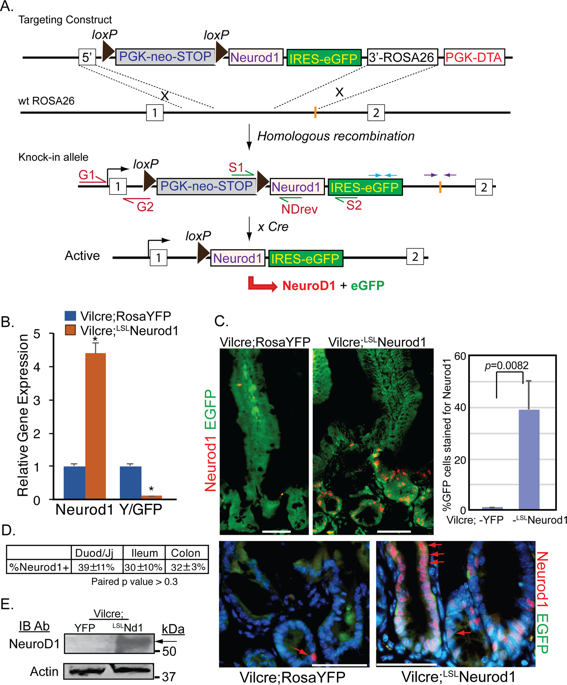Our official English website, www.x-mol.net, welcomes your
feedback! (Note: you will need to create a separate account there.)
Intestinal Neurod1 expression impairs paneth cell differentiation and promotes enteroendocrine lineage specification.
Scientific Reports ( IF 3.8 ) Pub Date : 2019-12-20 , DOI: 10.1038/s41598-019-55292-7 Hui Joyce Li 1 , Subir K Ray 1 , Ning Pan 2, 3 , Jody Haigh 4 , Bernd Fritzsch 2 , Andrew B Leiter 1
Scientific Reports ( IF 3.8 ) Pub Date : 2019-12-20 , DOI: 10.1038/s41598-019-55292-7 Hui Joyce Li 1 , Subir K Ray 1 , Ning Pan 2, 3 , Jody Haigh 4 , Bernd Fritzsch 2 , Andrew B Leiter 1
Affiliation

|
Transcription factor Neurod1 is required for enteroendocrine progenitor differentiation and maturation. Several earlier studies indicated that ectopic expression of Neurod1 converted non- neuronal cells into neurons. However, the functional consequence of ectopic Neurod1 expression has not been examined in the GI tract, and it is not known whether Neurod1 can similarly switch cell fates in the intestine. We generated a mouse line that would enable us to conditionally express Neurod1 in intestinal epithelial cells at different stages of differentiation. Forced expression of Neurod1 throughout intestinal epithelium increased the number of EECs as well as the expression of EE specific transcription factors and hormones. Furthermore, we observed a substantial reduction of Paneth cell marker expression, although the expressions of enterocyte-, tuft- and goblet-cell specific markers are largely not affected. Our earlier study indicated that Neurog3+ progenitor cells give rise to not only EECs but also Goblet and Paneth cells. Here we show that the conditional expression of Neurod1 restricts Neurog3+ progenitors to adopt Paneth cell fate, and promotes more pronounced EE cell differentiation, while such effects are not seen in more differentiated Neurod1+ cells. Together, our data suggest that forced expression of Neurod1 programs intestinal epithelial cells more towards an EE cell fate at the expense of the Paneth cell lineage and the effect ceases as cells mature to EE cells.
中文翻译:

肠 Neurod1 表达损害潘氏细胞分化并促进肠内分泌谱系规范。
转录因子 Neurod1 是肠内分泌祖细胞分化和成熟所必需的。一些早期的研究表明 Neurod1 的异位表达将非神经元细胞转化为神经元。然而,异位 Neurod1 表达的功能后果尚未在胃肠道中得到检验,并且尚不清楚 Neurod1 是否可以类似地改变肠道中的细胞命运。我们培育了一个小鼠品系,使我们能够在不同分化阶段的肠上皮细胞中条件性表达 Neurod1。 Neurod1 在整个肠上皮中的强制表达增加了 EEC 的数量以及 EE 特异性转录因子和激素的表达。此外,我们观察到潘氏细胞标记物表达显着减少,尽管肠上皮细胞、簇状细胞和杯状细胞特异性标记物的表达在很大程度上不受影响。我们早期的研究表明,Neurog3+ 祖细胞不仅产生 EEC,还产生杯状细胞和潘氏细胞。在这里,我们发现 Neurod1 的条件表达限制 Neurog3+ 祖细胞采用潘氏细胞命运,并促进更明显的 EE 细胞分化,而这种效应在分化程度更高的 Neurod1+ 细胞中没有看到。总之,我们的数据表明,Neurod1 的强制表达使肠上皮细胞更倾向于 EE 细胞的命运,但以潘氏细胞谱系为代价,并且随着细胞成熟为 EE 细胞,这种效应就会停止。
更新日期:2019-12-20
中文翻译:

肠 Neurod1 表达损害潘氏细胞分化并促进肠内分泌谱系规范。
转录因子 Neurod1 是肠内分泌祖细胞分化和成熟所必需的。一些早期的研究表明 Neurod1 的异位表达将非神经元细胞转化为神经元。然而,异位 Neurod1 表达的功能后果尚未在胃肠道中得到检验,并且尚不清楚 Neurod1 是否可以类似地改变肠道中的细胞命运。我们培育了一个小鼠品系,使我们能够在不同分化阶段的肠上皮细胞中条件性表达 Neurod1。 Neurod1 在整个肠上皮中的强制表达增加了 EEC 的数量以及 EE 特异性转录因子和激素的表达。此外,我们观察到潘氏细胞标记物表达显着减少,尽管肠上皮细胞、簇状细胞和杯状细胞特异性标记物的表达在很大程度上不受影响。我们早期的研究表明,Neurog3+ 祖细胞不仅产生 EEC,还产生杯状细胞和潘氏细胞。在这里,我们发现 Neurod1 的条件表达限制 Neurog3+ 祖细胞采用潘氏细胞命运,并促进更明显的 EE 细胞分化,而这种效应在分化程度更高的 Neurod1+ 细胞中没有看到。总之,我们的数据表明,Neurod1 的强制表达使肠上皮细胞更倾向于 EE 细胞的命运,但以潘氏细胞谱系为代价,并且随着细胞成熟为 EE 细胞,这种效应就会停止。






























 京公网安备 11010802027423号
京公网安备 11010802027423号